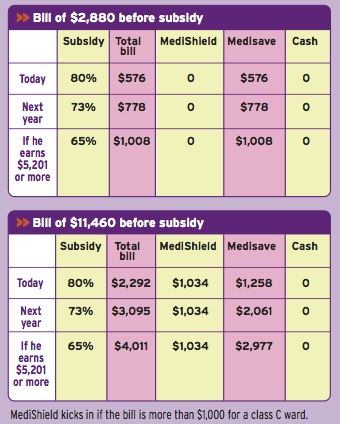Need help?
Hawksford offer services which make moving to Singapore straight-forward.
Singapore has a world-class healthcare system that is being reviewed as a model by the Obama administration’s healthcare team as it explores ways to reform the US healthcare system. In 2000, Singapore’s healthcare system was ranked by the World Health Organization (WHO) as the best in Asia – ahead of Hong Kong and Japan.
Singapore citizens and permanent residents are entitled to subsidised healthcare services provided through government healthcare facilities. Depending on various factors, the amount of subsidy can range from 50% to 80%. Further help in co-paying the balance of the medical bill is enabled through a compulsory savings scheme called Central Providence Fund (CPF). Depending on factors such as age and income, a percentage of the monthly salary of an employee is contributed to the CPF. Note that the CPF is not nationally redistributive and whatever amount you contribute will be for your own or dependents’ use only, it will not be used to subsidise the benefits for another employee who may have earned less than you. Part of the CPF contributions goes towards medical insurance schemes namely Medisave, Medishield Life, ElderShield and Medifund that collectively can handle major part of the co-pay amounts.
To illustrate an example, Mr. X who is a Singapore citizen earns S$4,167 a month. He is then hospitalised where he chooses to stay in a Class C ward. Below is a breakdown of what he can expect to pay and what he can expect to be subsidised under two different scenarios:
Medisave Bill Subsidy (source: Ministry of Health)

To know more about subsidised healthcare system for Singaporeans, refer to Ministry of Health website.
If you are a foreigner working in Singapore, you are exempted from CPF contributions but this also means that you do not have access to the government’s subsidised health insurance schemes. The good news is that day-to-day healthcare services are quite affordable in Singapore even if you don’t have any health insurance. However, it is also advisable that you consider your health insurance options to safeguard you and your family in the event of any critical illnesses.
If your Singapore employer is a medium to large-sized company, it is likely that the company will provide a health insurance policy that covers you and your family. You should check health insurance benefits with your potential employer if you are in the process of relocating to Singapore. If you have your own business or are considering providing health benefits to your employees, you should seriously consider taking up a private health insurance policy to cover for at least critical illnesses. There is a variety of choices and healthy competition among internationally recognised health insurance companies who can offer you a policy that suits your needs. Depending on your age, lifestyle habits, and the type of policy, the monthly cost of a critical illness private health insurance may range from S$75 to S$400 per insured person.
Finding the right medical insurance policy can be a very time-consuming task and prone to error as insurance companies usually have many exclusions and exceptions in their coverage policies. It’s very important to read the fine print to be sure you know what you are getting in the policy. A good alternative is to engage an independent insurance broker who has in-depth knowledge of policies from various insurance companies and can recommend you a policy that’s best suited to your particular requirements.
Public healthcare facilities are divided into 6 clusters: Alexandra Health Pte Ltd (anchored by Khoo Teck Puat Hospital in the North), Eastern Health Alliance (anchored by Changi General Hospital in the East), National Healthcare Group (anchored by Tan Tock Seng Hospital in the central region), National University Health System (anchored by National University Hospital), Jurong Health (anchored by the upcoming Jurong General Hospital in the west) and SingHealth (anchored by the Singapore General Hospital). These clusters were made to foster vertical integration of services, enhance synergy and economies of scale in-line with the government’s aim to spur innovation and improve the quality of healthcare while keeping medical costs affordable.
Below are some of the main public hospitals and centres in Singapore:
Below is a list of major private hospitals and medical centres in Singapore:
Charges listed here are for general information purposes only and perhaps more relevant to non-insured individuals. For government-subsidised and privately insured patients, the majority of the medical services bill will be absorbed by the third party.
Day-to-day healthcare services are relatively affordable in Singapore. A routine check-up with a General Practitioner plus (generic) medicine will likely cost you around S$20-S$30 while blood-work and x-ray will cost you around S$50-S$80. Roughly 20% of primary health care is provided through the government polyclinics, while the remaining 80% is provided through some 2,000 private medical clinics. Specialist consultation in a private clinic might cost you between S$75 -S$125.
Hospitalisation charges vary depending on the type of ward. Wards in Singapore vary from open wards with no air-conditioner to a private medical suite that's almost similar to a royal suite at a 5-star hotel. Accordingly the daily charges for a ward can vary from S$30 to S$3000. Charges between government and private hospitals for non-subsidised patients are very similar. For more details on charges by various Singapore hospitals, refer to MOH web page.
Singapore provides a unique value-proposition for major surgeries to patients around the world. The city-state is able to provide world-class healthcare service at a relatively affordable cost. The table below provide a rough comparison chart for illustration purposes:
| Medical Procedure | USA | Singapore | Thailand |
|---|---|---|---|
| Heart Bypass | $140,000 | $25,000 | $15,000 |
| Hip Replacement | $45,000 | $13,000 | $13,000 |
| Knee Replacement | $40,000 | $15,000 | $12,000 |
Hawksford offer services which make moving to Singapore straight-forward.
It's easy and quick. Let us help you get established in Singapore.
Contact usBack to top